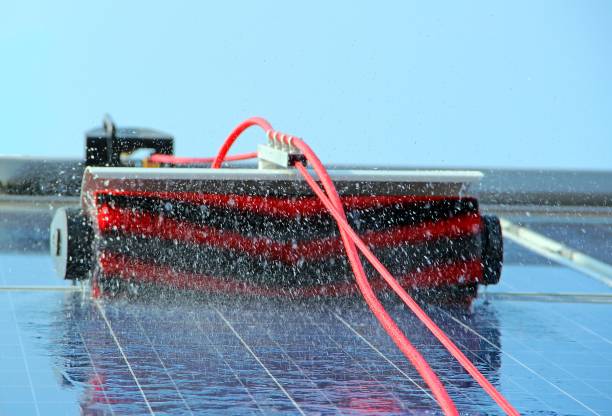Solar panels are a great way to harness the power of the sun and reduce electricity costs. However, maintaining them through regular cleaning is essential for optimal performance. This guide will explore the importance of residential solar panel cleaning in Fresno Ca, best practices, and frequently asked questions, providing homeowners with the knowledge needed to keep their systems running at peak efficiency.
Why Residential Solar Panel Cleaning Matters
Dust, dirt, pollen, bird droppings, and other debris can accumulate on solar panels over time, blocking sunlight and reducing energy production. Studies show that dirty panels can lose up to 20% of their efficiency. Regular cleaning is crucial to ensure your solar investment continues to perform well, saving energy and money.
How Often Should You Clean Your Solar Panels?
The frequency of cleaning depends on various factors like location, weather conditions, and nearby vegetation. In areas with high dust, pollen, or bird activity, cleaning once every three to six months is recommended. In cleaner environments, once or twice a year may suffice.
DIY Solar Panel Cleaning vs. Professional Cleaning
While homeowners can clean solar panels themselves, professional cleaning services offer specialized tools and techniques that ensure a safe and thorough job. DIY cleaning may be sufficient for lightly soiled panels, but professionals are best equipped to handle stubborn grime, bird droppings, and hard-to-reach panels on rooftops.
Best Tools and Materials for DIY Cleaning
For those who opt for DIY cleaning, having the right tools is essential. Basic materials include:
- A soft brush or microfiber cloth to avoid scratches
- A hose with gentle water pressure
- Eco-friendly, non-abrasive cleaning solution if needed
- A squeegee or soft sponge for drying
Avoid using high-pressure washers, harsh chemicals, or abrasive materials, as they can damage the panel surface and void warranties.
Step-by-Step Guide to Cleaning Solar Panels Safely
- Turn Off the System: Before starting, switch off the solar system to prevent electric shock.
- Inspect the Panels: Check for damage or loose wiring.
- Rinse with Water: Spray the panels gently with water to remove loose dirt.
- Use a Soft Brush or Sponge: Apply a gentle cleaning solution and scrub lightly to remove any remaining grime.
- Rinse Again and Dry: Use a squeegee or soft cloth to remove excess water, preventing streaks or mineral spots.
Avoiding Common Mistakes During Cleaning
To protect your panels, avoid these common mistakes:
- Using abrasive materials: These can scratch the panel surface.
- Cleaning on hot days: Cleaning under the sun can cause water to evaporate quickly, leaving streaks or spots.
- Using harsh chemicals: These can erode the panel surface, affecting efficiency.
Benefits of Regular Solar Panel Cleaning
Regular cleaning ensures that your solar panels:
- Operate at peak efficiency, maximizing energy output
- Extend their lifespan by preventing damage from accumulated debris
- Help you save more on electricity bills over time
- Maintain a cleaner, more attractive appearance on your property
Choosing a Professional Solar Panel Cleaning Service
Professional cleaners are trained to handle complex solar panel installations safely. When choosing a service provider, look for companies with:
- Experience in solar panel maintenance
- Proper licenses and insurance
- Eco-friendly cleaning products and practices
- Positive customer reviews and fair pricing
Costs of Solar Panel Cleaning
Professional cleaning costs vary depending on panel size, location, and accessibility. On average, homeowners may expect to pay between $100 to $300 per cleaning session. Some providers offer discounts for scheduled maintenance plans, making it more affordable to keep your panels clean year-round.
FAQs
Q1: Is it safe to clean solar panels myself?
Yes, it’s safe if done carefully with the proper tools. However, professional cleaners are recommended for high or hard-to-reach panels to ensure safety and thorough cleaning.
Q2: How much does solar panel dirt impact efficiency?
Dirt and debris can reduce efficiency by up to 20% or more, depending on the level of accumulation and weather conditions.
Q3: Can I use a pressure washer to clean my panels?
No, high-pressure washers can damage solar panels. Use a gentle hose spray instead.
Q4: When is the best time of day to clean solar panels?
Early morning or late afternoon are ideal times for cleaning, as panels are cooler and water won’t evaporate as quickly.
Q5: What type of cleaning solution should I use?
Mild, eco-friendly soaps are best. Avoid harsh chemicals that can damage the panel’s surface.
Summary
Keeping solar panels clean ensures that they operate efficiently and helps you get the most out of your solar investment. Whether you choose to clean them yourself or hire a professional, regular maintenance will allow you to maximize your home’s energy output while extending the life of your solar system.
